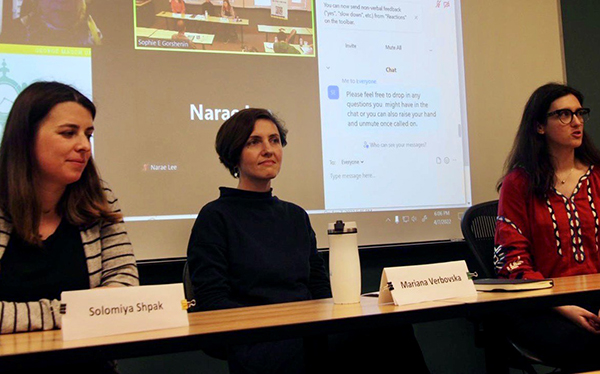
The war in Ukraine was brought home on April 7 when three students with direct ties to the besieged country presented an “Ask Me Anything” session with members of the George Mason University community. The 90-minute event took place with an audience of about 30 at Van Metre Hall at Mason Square (formerly the Arlington Campus).
Solomiya Shpak, one of the panelists and current postdoctoral fellow at the Schar School of Policy and Government at Mason, was in Kyiv as Russia started bombing Ukrainian cities early on the morning of February 24. Shpak, eight months pregnant at the time the war began, told the audience how she and her family escaped Kyiv to western Ukraine by car.
Facing continued peril in Lviv, the family took the arduous 22-hour drive to the Romanian border. Her husband, however, was not permitted to leave the country and remained behind while the rest of the family continued to Hungary.
“Thankfully, we reached Budapest safely and stayed there for another week where friends from Hungarian Academy of Sciences organized a place to stay for us,” she said. “In Budapest, we decided that the best decision for us would be to go to Washington, D.C., where I can have huge support network.”
That network included Schar School faculty, fellow students, and other Ukranians, as well as former colleagues of her husband’s from the National Endowment for Democracy. Administrators at the Schar School offered a postdoctoral fellowship upon her return.
Mariana Verbovska, a Fulbright fellow at Mason’s Department of Communication, came to the university in November 2021 with her husband and 3-year-old son; the rest of her family, including her mother and father, remained in Ukraine to face the eventual Russian onslaught.
“My parents live in a region that has a border with Belarus, so they are not safe,” she said. “My friends are in Lviv and Kyiv, and it's heartbreaking to read the news and get messages from them.”
Mariia Panga, a PhD student at the Schar School, shared how she found out about the war from her new home in Arlington, Virginia, near Mason Square.
“It was around 11 p.m.,” she told the Mason audience. “I was watching the live broadcast of the UN Security Council. There the permanent representative for Ukraine told the Council that Putin declared war on Ukraine. I started panicking. I looked at my phone and I saw posts on Facebook that Kyiv, Kharkiv, and Odesa were being bombed. I will never forget this moment.”
One of the participants asked a question about the current safety of the panelists’ families and friends. The panelists were unequivocal and in unanimous agreement: “Nobody is safe in Ukraine,” they said.
They also verified news reports that Russia is targeting residential buildings, hospitals, and bomb shelters.
Other questions from the audience touched on how those in the U.S. can assist Ukraine (donate to reliable humanitarian organizations, contract Congressional representatives), how the war might end, and why Vladimir Putin is obsessed with Ukraine.
Panga also announced an online petition for the Mason community.
In the end, the panelists offered they only thing they could be sure of: hope.
“But we are resilient,” Verbovska declared. “I firmly believe that love and truth will win, and that this is a historic turning point.”
